Dr. Paul T. P. Wong’s autobiography, A Lifelong Search for Meaning: Lessons on Virtue, Grit, and Faith, is published in weekly installments. Stay updated here.
This was my fourth and longest lecture tour in Taiwan. I ask myself: Why am I so attracted to Taiwan? Why do I keep on going back, again and again?
There are many reasons for my love affair with Taiwan. At an emotional level, I feel fully identified with Taiwan, probably because we are both struggling to have our voices heard when the world only listens to money and power. Furthermore, we both feel like a little shepherd boy David standing up against a Goliath with courage and confidence. On a personal level, I feel well loved by many good friends in Taiwan. At a deeper level, I feel that I have finally found an academic home, even though I do not hold any academic positions in Taiwan.
In my previous chapter, I mentioned my lifelong struggle of swimming against a mighty tide. I really wish that I could have followed the hit parade and enjoyed an easier life, but I cannot deny my nature and the conviction that the function of psychology is to understand and help people in their struggle for survival and happiness.
No Longer Alone
As an animal learning researcher, I objected to the barren Skinner box and simple runway, because I believed that such an artificial and restricted environment would not allow the subjects to display their true adaptive capabilities.
As a researcher on positive aging, I objected to the medical model of focusing only on biological factors and believed that spiritual and existential factors are equally important for aging well.
As a positive psychologist, I object to the single focus on the positive and believe that a complete account of wellbeing must consider the negative as a necessary part of our yin-yang reality.
As a meaning therapist, I do not want to be boxed into logotherapy only, because I realize the need to integrate different approaches to meaning in life issues (Vos et al., 2017; Wong, 2012) and therapeutic modalities in order to be most helpful to most people.
Consequently, I have been fighting a lonely battle in most research areas of psychology. This predicament is not caused by my desire to be a maverick, but by my conviction that the truth is always bigger than any existing school of psychology.
Ironically, this integrative big-tent approach turns out to be a narrow path, shunned by most researchers. It is understandable why very few people have joined me, because my path represents a difficult and unprofitable career choice. Only an idealistic fool would be willing to make such personal sacrifices.
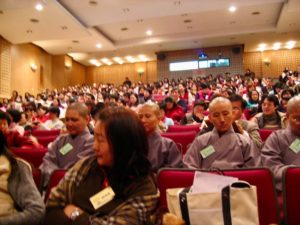
Taiwan lecture tour in 2006.
What a different experience in Taiwan! It does not matter where I teach, the response is the same: enthusiastic support of my holistic approach. Finally, I have found my kindred spirits or “知音”. For my entire academic career, I have been a lone voice in the wilderness, but, in Taiwan, I find myself surrounded by a cheering choir. It is difficult to describe the kind of rewarding feeling I experienced while teaching in Taiwan. At long last, I was able to achieve a deep emotional and intellectual connection with all my audiences in Taiwan.
I can attribute to this strong bond to shared cultural values and understanding of what contributes to the good life. More importantly, these audiences bring back memories of Tianjin, my birthplace, and all the simple but kind-hearted folks from my childhood.
Everywhere I went, I was greeted by the warmest and friendliest people I have ever met. Everywhere I went, I witnessed a hardworking, peace-loving people doing their best in a hostile world, where they are isolated, squeezed politically and economically, and threatened militarily by a much stronger neighbour.
The Miracle of Taiwan
The miracle of Taiwan is that, in spite of all their hardships, they remain a model country of peace and prosperity, with a high human development index and GDP, because of their commitment to developing the human capital and a technology-oriented economy (Runde, 2015).
Furthermore, one can witness a general awareness and systematic practice of recycling in Taipei as well as in small townships. Their efforts to protect the environment are not dictated by the government, but compelled by a higher motivation of caring for planet earth. There is a large dedicated group of volunteers in recycling and other practices of environment protection. That is why Taiwan has become a world leader in greening (Stocker, 2017).
They do not have much in terms of population and natural resources, but they are able to make the most of what they do have. Taiwan is certainly a very friendly, peaceful, and safe place to live, with lush green mountains, clean blue waters, and orderly urban centers. If more countries model after Taiwan, we would have a kinder and gentler world.
Taiwan’s political transformation and economic success are primarily due to its robust constitutional democracy, the kind of government dreamed of by many generations of young Chinese idealists. I believe that life education and religion have played an important role in Taiwan’s resilience and prosperity.
Life Education as a Core Curriculum
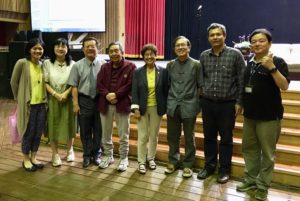
With the leaders of Wenzao Ursuline University of Languages after my public lecture.
Taiwan is the first country where life education is officially incorporated into the curriculum at all levels of the public school system. I had the privilege of speaking at the International Conference of Life Education at the National Taipei University of Nursing and Health Science. I also had the privilege of providing consultation to the Wenzao Ursuline University of Languages regarding their international project on life education.
I have always considered Taiwan’s life education as a meaning-centered approach to positive education or positive education 2.0 (PE 2.0), the topic of my address at both the National Kaohsiung Normal University and Fo Guang University. While agreeing with the broad mission of positive education to “equip young people with the knowledge and life skills to flourish and contribute to the flourishing of others,” life education remains distinct in its approach and practice.
Life education or PE 2.0 begins with the emphasis on cultivating the spiritual nature of love and compassion inherent in every human being. It also emphasizes the need for moral courage and life intelligence to embrace and transform the inevitable dark side of human existence. Happiness is considered a by-product of self-transcendent pursuits, rather than an end value in Asian cultures. It remains an empirical question whether life education in Taiwan is a more effective approach than the positive education programs in the West in contributing to character development, individual wellbeing, and civil societies.
One of the main developments from my recent lecture tour was witnessing the initial planning meeting to start a Chinese Meaning-Centered Education and Counselling network as a sister organization of the International Network on Personal Meaning (INPM). This organization will be led by Harriet Wu, Suemay Chang, and Chiyun Lin, all lifetime members of the INPM.
A Compassionate Culture
A robust constitutional democracy provides the necessary political climate for individuals with vision and competence to freely pursue their dreams and contribute to society. The Bliss and Wisdom experiment is perhaps the best example. About 20 years ago, the late Venerable Master Ri Chang created the Bliss and Wisdom Organization to better the world through teaching Dharma, creating a compassion-based school, experimenting with organic farming, and pursuing various kinds of compassionate entrepreneurships.
Facing harsh conditions and formidable obstacles, he never gave up in his pursuits. Calling himself “the constantly defeated general,” he managed to get back on his feet each time and continued to pursue his ideal of benefiting all living beings.
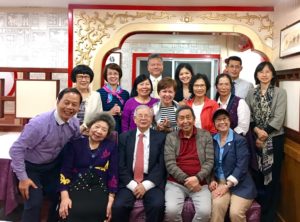
Leaders of Buddhist organizations.
Now, under the leadership of Spiritual Teacher ZhenRu, the Bliss and Wisdom Organization is the undisputed leader in Taiwan of organic agriculture, environmental protection, and compassionate services from its millions of members of the Sangha community.
In addition, I had the privilege to speaking at Tzu Chi University and learned about the extensive medical and charitable activities of Tzu Chi Foundation in Taiwan and around the globe. At an earlier lecture tour, I spoke to 400 people as organized by the Buddhist Lotus Hospice Care Foundation and learned about the importance hospice work in Taiwan. Together, the compassionate work of Buddhist non-profit organizations has greatly contributed to the wellbeing and culture of Taiwan. Here is a photo of my dinner with leaders of Buddhist organizations.
Global Wellbeing and Mature Happiness
I am pleased to have the privilege of sharing my vision of global wellbeing through the second wave of positive psychology (PP 2.0) with the leaders of the Bliss and Wisdom Foundation. PP 2.0 posits that the best way to live a fulfilling life is through (1) accepting and transcending suffering and (2) living a life of meaning and compassion in serving others. More specifically, I introduced a new model of global wellbeing and flourishing in spite of suffering. This model consists of six components: Courage, Acceptance, Self-Transcendence, Meaning, Appreciation, and Compassion (CasMac). This model complements Seligman’s (2011) PERMA model. I predicted that CasMac is more relevant to the suffering masses, while PERMA is more relevant to people living in peace and prosperity.
Finally, I introduced a new construct of happiness or wellbeing—noetic or mature happiness—to complement hedonic and eudaimonic wellbeing, which are dominant in Western psychology. In contrast, mature happiness is characterised by inner harmony, acceptance, gratitude, contentment, and having peace with oneself, others, and the world. Such happiness results from self-cultivation in spiritual and psychological maturity and overcoming suffering and adversities. I pointed out that we all want to attain happiness and avoid suffering, but, ultimately, we can discover mature happiness only through accepting and transforming suffering. These ideas were later presented in a paper on the science of global wellbeing and mature happiness (Wong & Bowers, in press).
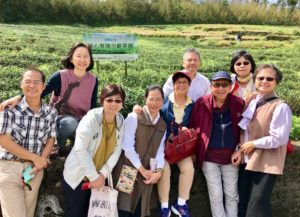
With happy volunteers from the Bliss and Wisdom Foundation at their organic tea plantation. Jack Huang is the gentleman in the white shirt at the back.
It is gratifying that the leading monks at the meeting validated my presentation on PP 2.0 (Huang, 2017). Jack Huang, author of the above article and Director of the Higher Education Staffs in Bliss and Wisdom, summarized it well when he said to me with a smile, “We have actually been practicing PP 2.0, because all our activities are motivated by compassion for all living things and the meaningful purpose of serving others.”
Personally, in visiting their school, organic farms, and tea-processing factory over my month-long stay in Taiwan, I have discovered that their volunteers are among the kindest and happiest people I have ever met. This reminds me of the findings that the happiest person in the world is a Buddhist monk (Shontell, 2016) and the happiest people are the Buddhist Bhutan (Hindy, n.d.). In a sense, the 20-year experiment of the Bliss and Wisdom Organization can be viewed as a large field research on the validity of PP 2.0. Such research seems to have more external validity than laboratory research. I invite my positive psychology friends to study these Buddhist volunteers in Taiwan and discover their secrets of mature happiness.
Now, my readers should have a pretty good idea why I consider Taiwan my academic home. The people there not only embrace my teaching but actually practice it, demonstrating the validity of PP 2.0 in enhancing global wellbeing. My last academic dream is that a foundation will provide the necessary funds for a research institute to provide a solid empirical basis for PP 2.0 and life education.
References
- Huang, J. (2017, October 24). 正向心理學2.0與佛法 — Dr. Paul T. P. Wong 與福智僧團法師對話 / Positive Psychology 2.0 and Dharma — Talk between Dr. Paul T. P. Wong and Bliss & Wisdom Buddhist Sangha Community. Bliss and Wisdom. Retrieved from http://www.blisswisdom.org/events/e/1981-40532/
- Runde, D. (2015, May 26). Taiwan is a model of freedom and prosperity. Forbes. Retrieved from https://www.forbes.com/sites/danielrunde/2015/05/26/taiwan-development-model-freedom-prosperity/1#1df5a91971a5
- Seligman, M. E. P. (2011). Flourish: A visionary new understanding of happiness and well-being. New York, NY: Free Press.
- Shontell, A. (2017, January 27). A 69-year-old monk who scientists call the ‘world’s happiest man’ says the secret to being happy takes just 15 minutes a day. Business Insider. Retrieved from http://www.businessinsider.com/how-to-be-happier-according-to-matthieu-ricard-the-worlds-happiest-man-2016-1
- Stocker, M. (2017, October 30). Taiwan must own its global leadership in recycling. The News Lens. Retrieved from https://international.thenewslens.com/article/81955
- Vos, J., Cooper, M., Hill, C. E., Neimeyer, R. A., Schneider, K., & Wong, P. T. P. (2017). Five perspectives on the meaning of meaning in the context of clinical practices. Journal of Constructivist Psychology. Advance online publication. doi:10.1080/10720537.2017.1390511
- Wong, P. T. P. (2012). Introduction: A roadmap for meaning research and applications. In P. T. P. Wong (Ed.), The human quest for meaning: Theories, research, and applications (2nd ed., pp. xxvii-xliv). New York, NY: Routledge.
- Wong, P. T. P. & Bowers, V. (in press). Mature happiness and global wellbeing in difficult times. In N. R. Silton (Ed.), Scientific concepts behind happiness, kindness, and empathy in contemporary society. Hershey, PA: IGI Global.
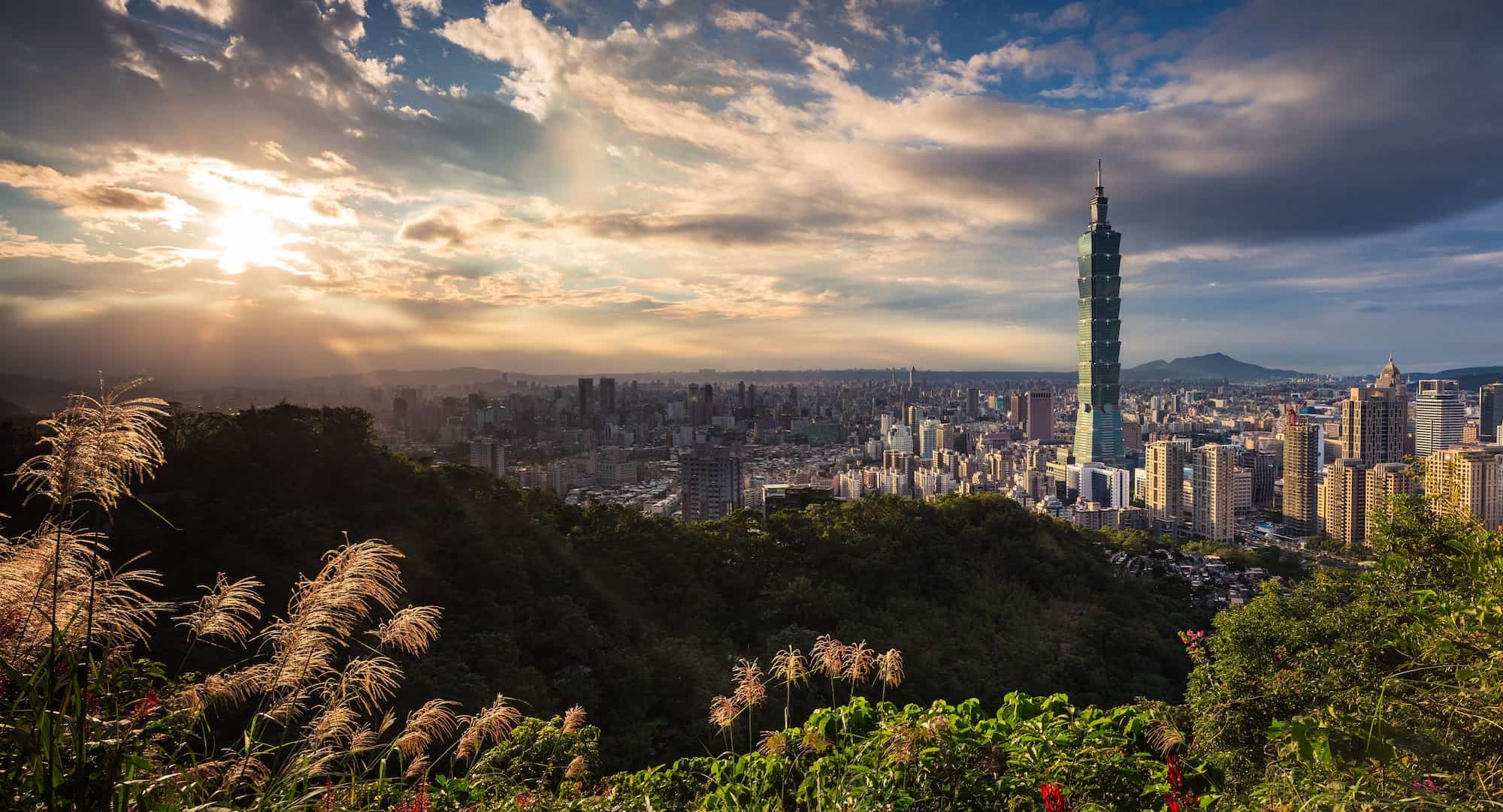
 Meaning Conference 2025 will be the INPM’s first in-person conference with a virtual option after the pandemic.
Meaning Conference 2025 will be the INPM’s first in-person conference with a virtual option after the pandemic.